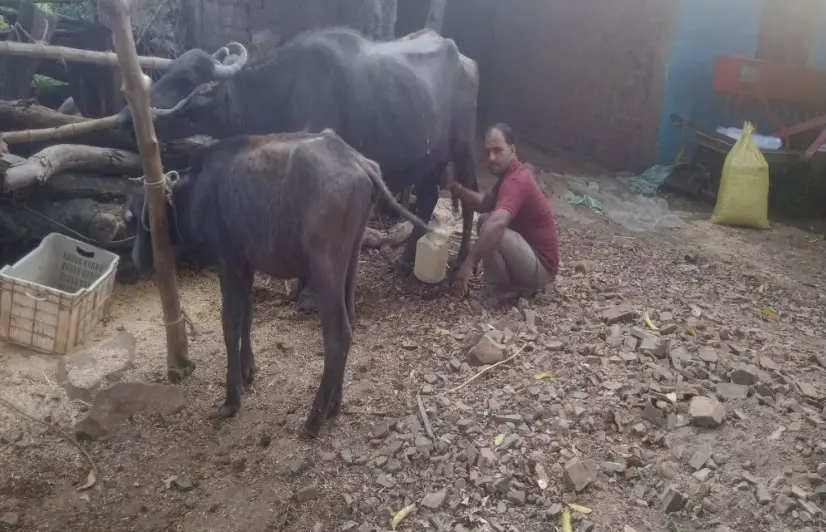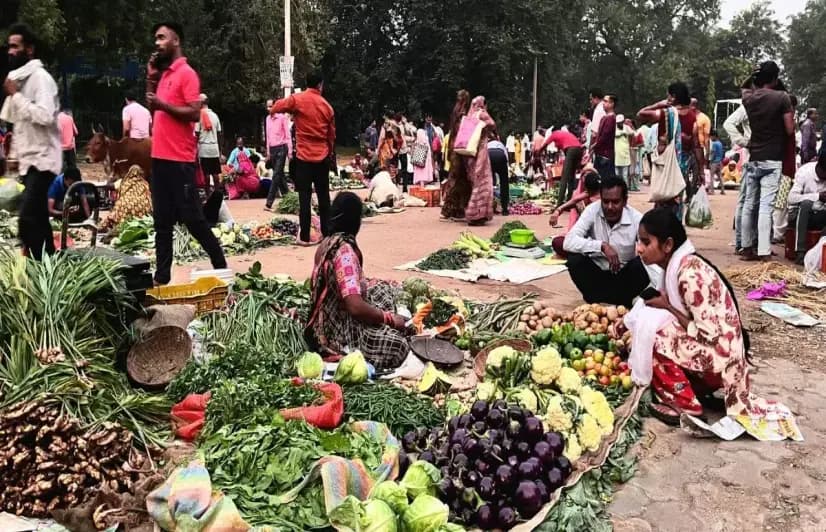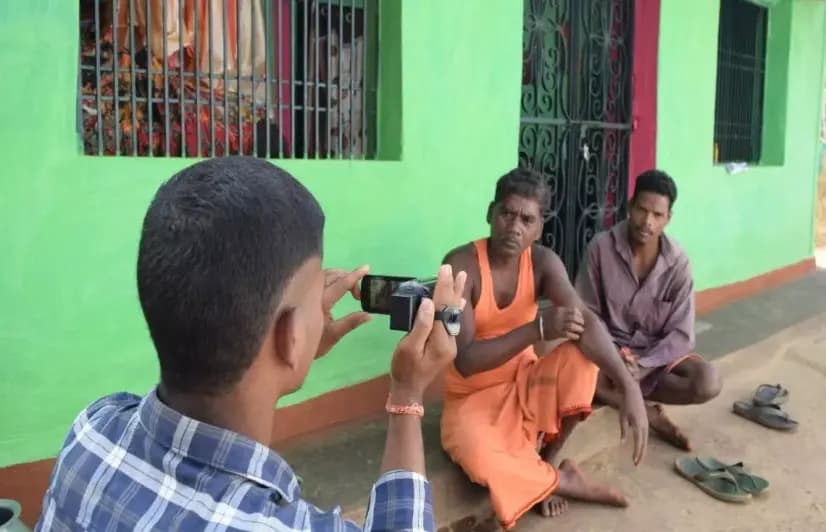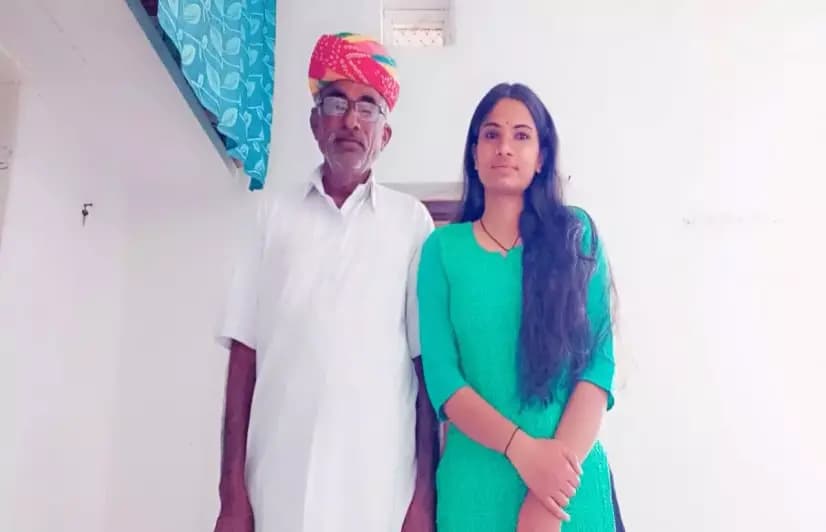This Madhya Pradesh village gives out free dairy products

This Madhya Pradesh village gives out free dairy products
People in Chudiya do not trade in milk, buttermilk and curd, in accordance with the promise supposedly given to an 18th-century monk for lifting the curse of cholera
Bhopal, Madhya Pradesh: Two
good quality cows can give up to 40 litres of milk daily. One litre of full
cream milk costs around Rs 60 in Bhopal, which translates into a daily maximum
income of Rs 2,400. Despite the rising inflation, the residents of Chudiya in
Betul district of Madhya Pradesh have been letting go of this potential
earning of Rs 72,000 a month.
By doing so, people claim they are fulfilling a promise they believe their
ancestors had given to Chindhiya Sadhu for lifting the curse
of cholera from the village. No documents are available to show the life and
times of the revered monk, but villager Babulal Yadav says his brother’s
great-grandson, Tukdu Maharaj, still lives in the village. People believe that Chindhiya
Sadhu lived in the 18th century by taking note that Maharaj is an
octogenarian.
“The villagers had made a promise to never trade in milk, buttermilk and curd. We have been following this for five generations now. We distribute all of it for free,” Gorelal Yadav (80) tells 101Reporters.
While many a home budget has been buckled keeping up with the
persistently high inflation, the 400 households of Chudiya follow their age-old
tradition. “Over 90% of the families here are into agriculture. Most
households have anywhere between two to 10 cows. A farmer will spend Rs 50 to
100 on a cow daily. For milch cows, it will go up to Rs 200, excluding fodder. Hiring
labourers to clean the place where animals are kept, running a motor pump to
meet their water requirements, and medical care are among the main expenses,”
says Ramkishore Yadav.
Yashwant Yadav, another villager, adds that expenses went up to Rs 500
per cattle, including the cost of vaccination and preventive medicines, during
the Lumpy Skin Disease outbreak.
“Earlier, cattle were set free on fallow pastures for grazing. As more
and more land has been diverted for agriculture, they have to be tied up and
fodder arranged,” says Ramkishore.
Bhujlal Yadav (75) claims that every villager follows the tradition
willingly. “Be it good or bad days, we manage our expenses based on the
situation… Selling milk is never in our calculation.”
A two-day annual fair is organised on Kartik Purnima in honour of
Chindhiya Sadhu, with his tomb as the centre of attraction. Puris and halwa made
from Chudiya ghee draw a large crowd to the bhandara (community feast) on both days. The villagers also maintain an eternal flame running on ghee in honour
of the monk.
Not just the elders, even the youth stand by this tradition. “I got to
know about the sadhu from my grandparents. He took the oath of
celibacy, lived an ascetic life and helped our village… and in return, he took
a small oath from us. There is no question of not following it,” says Aryan
Yadav, a village youth.
Chudiya villagers welcome with open arms any person who needs milk, curd
or buttermilk. Of course, the distribution is free!
“Chudiya is about 25 km from my village. Whenever there is a big event
in our family or village, we get buttermilk from there. We inform them ahead of
schedule in case of a big order, and they will keep the buttermilk ready for
us. No one takes money even if you offer a token amount as a goodwill gesture,”
says Sevak Yadav, a farmer and social worker of Lakkadjam.
“This tradition allows us to do public service. The cost factor does not
apply. Our buttermilk is famous, especially at weddings,” beams Yashwant.
If there is no demand for milk, the villagers turn it into curd and buttermilk for domestic use and make ghee from it. The ghee, however, does not fall under the ambit of the ‘promise’. “We sell it under the label ‘Chudiya Ka Ghee’ for Rs 600 per litre. We do not make much profit, but there is no loss,” says Ranjan Yadav.
The villagers do not have to go out to sell ghee as prospective buyers
from Betul district headquarters, Chicholi block headquarters and Sarni town
reach out to them.
“For the residents, the sage is still alive. His invisible power ensures
our welfare. Had our ancestors given him the promise of not trading in ghee,
that would not have happened,” says Ramkishore, when asked why ghee was an
exception.
Though it is a noble act, the distribution of free milk makes a little
more sense when one considers the village’s income profile. The 4,000 residents
of Chudiya belong to Gawli, Thakur, and tribal communities. The region’s fertile black soil helps them grow wheat and vegetables and
sell them at Chicholi, located 5 km away, during the Tuesday weekly markets. A
canal from the Godhna dam brings water to their farms.
“Farmers get cattle fodder from the land. In return, cows provide manure
for farm work. Some households have cow dung-based biogas plants running. The
milk that cows provide nourishes the children of the households. We get
everything from our cows," says Gorelal.
Every household has at least one two-wheeler and tractor each. Every tenth house has a four-wheeler. Almost 90% of the families have pucca houses. In addition, the younger generations are migrating to Bhopal, Indore, Pune, Delhi, Nagpur and other places for studies and for earning white-collar jobs.
Cover photo - Ranjan Yadav milking a buffalo (Photo - Pooja Yadav, 101Reporters)
Edited by Tanya Shrivastava
Would you like to Support us
101 Stories Around The Web
Explore All News
Jun 11
‘’मलेरियाने माझा मुलगा अन् नवरा बी मेला’’... गडचिरोलीमध्ये तापमान बदलाचा आणि डासांचा काय आहे संबंध?

Jun 11
ओडिशा : जलवायु चुनौतियों से निबटने मैंग्रोव संरक्षण के कार्य में जुटी महिलाओं की कहानी
-5.webp&w=3840&q=75)
Mar 27
A Painful Period In The Salt Pans Of Little Rann Of Kutch
-13.webp&w=3840&q=75)
Mar 27
Madhya Pradesh: Where is Our Free Time?

Feb 02
Dilemma Faced By Poor Farmers In Bundelkhand: Grow Organic While Selling Non-Organic

Feb 02
Giridih saves its village ponds with NITI Aayog's help

Jul 29
Odisha students use mobile cameras and pens to preserve village history
-18.webp&w=3840&q=75)
Jul 29
Rajasthan: Fasal Bima Yojana and the Art of Minimising Payouts
-16.webp&w=3840&q=75)
May 25
Waste to wealth: Bhopal district panchayat spends Rs 75,000 per month to earn just Rs 4.5 lakh a year

May 10
A Victory For Unmarried Rajasthani Women As Anganwadi Positions Open For Them
About the Reporter
Top stories by Pooja Yadav
Write For 101Reporters
Would you like to Support us
Follow Us On
Editor's Pick
Surviving on mercy: Temporary sanitation workers in rural Tamil Nadu earn less than minimum wage
How Kerala heatwaves are boiling over to construction workers’ personal lives
Empowering didis: In Burhanpur, management of ration shops is boosting women’s confidence and financial independence
No childhood in the mangroves: What is the climate change’s toll on Sundarbans youth
In the remote, tribal villages of Gadchiroli, climate change is breeding malaria
Discontent and misgovernance as Tamil Nadu postpones panchayat elections
Curse of the canal: Seepage and waterlogging lay waste to agriculture in Rajasthan's Luni delta
Assam's ‘left-behind’ women wage lonely, futile battle against extreme floods
'Now we want the chair': Kashmir’s women SHG leaders gear up to fight panchayat elections
Recommended Topics
 The village is home to the tomb of Chindhya Sadhu. A grand two-day celebration
The village is home to the tomb of Chindhya Sadhu. A grand two-day celebration 

_(1).webp&w=3840&q=75)




